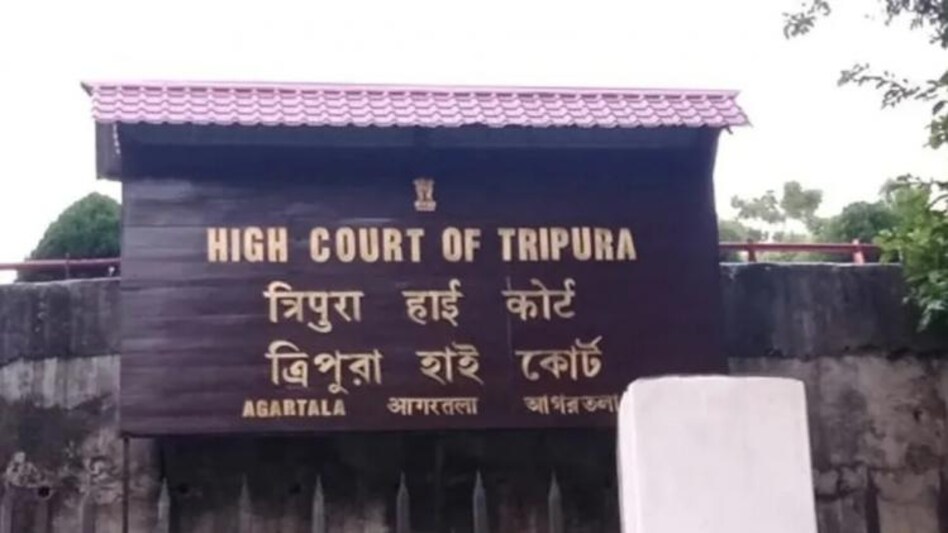Ram Prasanna Sharma, J
1. This first appeal is preferred under Section 96 of the Code of Civil Procedure, 1908 against judgment/ decree dated 24.06.2005 passed by 2nd
Additional District Judge, Baloda-Bazar (C.G.) in Civil Suit No. 3-A/2004, wherein the said court decreed the suit filed by the respondents for
declaring title, permanent injunction and in alternate possession of the suit land bearing Survey No. 2625/03 area admeasuring 0.101 Hectare situated
at Village- Bhatgaon, Tahsil- Bhatgaon, District- Raipur (C.G.).
2. Learned counsel for the respondent/ plaintiff submits that the suit land is a part of Survey No. 2625/01. Ancestral of respondent namely Shankar
Lal entered into an agreement with owner of the property namely Bindeshwari Devi and it is settled that land will be sold @ Rs. 120/- per dismil for
which Rs. 100/- was paid as advance money. After four years of the agreement, Rs. 500/- was paid regarding contract and after 2-3 days of the
payment of Rs. 500/-, Rs. 2400/- was again paid to Bindeshwari Devi by Shankar Lal. Receipt regarding payment of Rs. 2400/- is not given by
Bindeshwari Devi. Sale deed was not executed by Bindeshwari Devi, but possession of the land in question was delivered to Shankar Lal. As per
version of respondent, Shankar Lal was in possession after constructing house in the said land and granted electric connection in the said house in the
year, 1963 and after death of Shankar Lal, respondent/ plaintiff were in possession of the said land and acquired title by adverse possession. As per
version of the appellants/ defendant, the house is constructed in Survey No. 2625/02 area admeasuring 0.142 acre and it is not constructed in the suit
land bearing Survey No. 2625/03. Survey No. 2625/03 is open land which is fenced by the appellants and they are in possession of the land in
question.
3. Learned counsel for the respondent/ plaintiff submits that as per report of Tahsildar dated 11th March, 2004 (Ex.D/4), house is constructed in
Survey No. 2625/02 and it is not constructed in Survey No. 2625/03, but the trial court decreed the suit against the factual matrix and legal aspect of
the matter. When there is a dispute that whether the house is constructed in Survey No. 2625/02 or 2625/03, the trial court ought to have directed for
demarcation of land as per Section 129 of the Madhya Pradesh/ Chattisgarh Land Revenue Code, 1959 (for shot ""the Code, 1959""), but without
demarcating the land, the trial court passed the decree which is not liable to be sustained. Possession of the respondent is not adverse possession
because as per the pleading itself, they came into possession by way of agreement with Bindeshwari Devi, therefore, their possession is not adverse,
but the same is permissive possession. As the respondents were never willing to execute the contract, therefore, they cannot retain their possession
and in alternate, they were never in possession of the said land, therefore, finding of the trial court is liable to be reversed.
4. The first question for consideration before this Court is whether the respondents/ plaintiff were in adverse possession in the suit land since 1959 as
per their pleadings. The respondent adduced evidence of Harbanshi Lal Dewangan (PW-1), Phoolbai (PW-2) and Tikarama (PW-3) and filed
documents Ex. P/1 to P/26. Harbanshilal Dewangan (PW-1) is son of Shankar Lal Dewangan. As per version of this witness, Shankar Lal Dewangan
entered into an agreement with Smt. Bindeshwari Devi who was owner of the property. Advance money of Rs. 100/- and Rs. 510/- was given
towards agreement. Though, Rs. 2400/- was also paid to Bindeshwari Devi, but no receipt was given by her in this regard. Thereafter, possession was
delivered to them and they are in possession of the land in question since 1959.
5. In rebuttal, the appellants/ defendant side adduced evidence of Roop Singh Chouhan (DW-1), Naresh Kesharwani (DW-2), Ramji Lal Kesharwani
(DW-3), Dhoomudas (DW-4). As per version of Roop Singh Chouhan (DW-1) and other witnesses, the land in question was in possession of Roop
Singh Chouhan (DW-1) who is husband of daughter of Bindeshwari Devi namely Prabhakumari. As per version of this witness, the respondents are
not in possession of Survey No. 2625/03, but they are in possession of Survey No. 2625/02 area admeasuring 0.07 dismil.
6. Admittedly, the respondents are claiming their possession over the suit land on the basis of agreement to sale. Now, the point is whether the
possession entered in view of executory contract is adverse.
7. In the matter of Achal Reddy Vs. Ramakrishna Reddiar & others reported in (1990) 4 SCC 706, held as under:-
Adverse possession implies that it commenced in wrong and is maintained against right. When the commencement and continuance of possession is
legal and proper, referable to a contract, it cannot be adverse. Therefore, if a person is in actual possession and has a right to possession under a title
involving a due recognition of the owner's title his possession will not be regarded as adverse in law, even though he claims under another title having
regard to the well recognised policy of law that possession is never considered adverse if it is referable to a lawful title. In a case in which there is a
mere executory contract of sale where the tranferee is put in possession of the property in pursuance of the agreement of sale and where the parties
contemplate the execution of a regular registered sale deed, the principle of estopple applies estopping the transferee from contending that his
possession, while the contract remained executory in stage, was in his own right and adversely against the transferor. In such case the animus of the
purchaser throughout is that he is in possession of the property belonging to the vendor and that the former's title has to be perfected by a duly
executed registered deed of sale under which the vendor has to pass on and convey his title. The purchaser's possession in such cases is of a
derivative character and in clear recognition of and in acknowledgment of the title of the vendor.
8. Looking to the evidence of the respondents, it is clear that they recognized right of the transferer and there possession is in acknowledge of the title
of the Bindeshwari Devi, therefore, it is not an adverse possession.
9. In the matter of P.T. Munichikkanna Reddy & others Vs. Revamma & others reported in (2007) 6 SCC 59, held as under:-
4.........Having come into possession under the agreement, he must disclaim his right thereunder and plead and prove assertion of his independent
hostile adverse possession to the knowledge of the transferor or his successor in title or interest and that the latter had acquiesced to his illegal
possession during the entire period of 12 years i.e. up to completing the period his title by prescription nec vi, nec clam, nec precario. Since the
appellant's claim is founded on Section 53-A, it goes without saying that he admits by implication that he came into possession of land lawfully under
the agreement and continued to remain in possession till date of the suit. Thereby the plea of adverse possession is not available to the appellant.
10. The claim of the respondents is solely based on adverse possession, but their possession cannot be treated as adverse possession, therefore, they
are not entitled to retain possession of the land under doctrine of part performance. Case of the respondent is based on oral agreement and if the
agreement is not specifically enforced by saying that we are ready and willing to perform their part of contract, they cannot retain their possession
under Section 53-A of the Transfer of Property Act, 1882 (for short ""the Act, 1882"").
11. In the present case, there is no pleading regarding enforcement of contract, readiness and willingness of the respondent, therefore, protection
under Section 53-A of the Act, 1882 is not available to the respondents, therefore, finding arrived at by the trial court on the basis of oral agreement
and khasra entries is not sustainable because as per the law laid down as mentioned above, possession of the respondent cannot be termed as adverse
possession.
12. In the present case, as per version of the respondents, the possession is delivered to them and right of owner of Bindeshwari Devi is limited or
extinguished after the agreement since right of possession of the owner is limited or extinguished.
13. As per Section 17 of the Registration Act, 1908, when any right is limited or extinguished whether vested or contingent then, that can only be done
by registering the deed. This Section mandates that any document which has any right, title or interest in respect of immovable property, it must be
registered. In the present case, as per version of the respondents, possession of the property is delivered to them, but though no document is drafted
and registered, therefore, oral agreement is not valid.
14. The trial court passed its finding of adverse possession on the basis of khasra entries. Now, the point is whether the khasra entries were relevant
to convey or extinguish any title. In the matter of H. Lakshmaiah Reddy & others Vs. L. Venkatesh Reddy reported in 2015 SAR (Civil) 611, it is held
that mutation entries do not convey or extinguish any title and these entries are relevant only for the purpose of collection of land revenue.
15. In the present case, even if khasra entries taken as it is, the same will not prove adverse possession of the respondent because they entered into
possession on the basis of valid agreement and they are always recognized title of Bindeshwari Devi, who delivered possession to them. A sale deed
was never executed in favour of the respondent on the basis of any agreement and they never willing to perform their part of contract, therefore, their
possession is also not liable to be protected.
16. As a fall out and consequence of aforesaid discussion, finding arrived at by the trial court is not sustainable and is hereby set aside. Accordingly,
the decree is passed in favour of the appellants and against the respondents on the following terms and conditions:-
(i) The appeal is allowed. The suit filed by the respondents is dismissed with cost.
(ii) Parties to bear their own cost.
(iii) Pleaders' fee, if certified be calculated as per certificate or as per schedule whichever is less.
 (iv) A decree be drawn accordingly.

